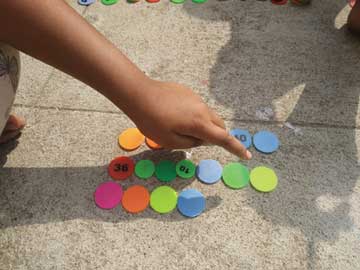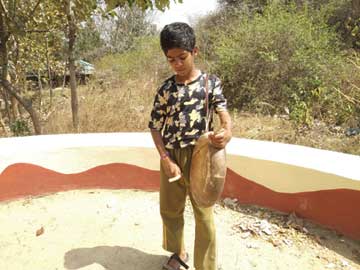Aditi Mathur and Ratnesh Mathur
What if maths was optional – an extracurricular subject – much like music? What would happen if the primary purpose of being exposed to maths, akin to music, was to enjoy and appreciate it (and not necessarily learn it)? Most of us do not learn music and yet most of us enjoy some form of it.
Some children like maths naturally, some don’t. Just like some like sports naturally, some don’t, some like reading naturally and some don’t and some like loads of friends while some like to be by themselves.
When it comes to music, most of us sing out of tune/rhythm; we do not mind it and we still sing (in bathrooms and elsewhere!). If people don’t like our singing, at the most, they may ask us to sing in private.
 What would happen if similarly we were allowed to do maths out-of-tune? And if by chance people did not like our math-mistakes, they just let us commit them in private.
What would happen if similarly we were allowed to do maths out-of-tune? And if by chance people did not like our math-mistakes, they just let us commit them in private.
When we need accuracy, beauty and quality in music, we switch on our MP3 players and listen to songs by professionals/musicians. What would happen if similarly we were allowed to – in maths – when requiring accuracy and quality – resort to calculators, apps or even take the help of professionals/mathematicians?
Most of us do not learn music (as in go to classes) because that is not how we use it in our lives. You see, in our lives we listen to music. What would happen if similarly – in maths we were to know only as much as we need in life? Now most of us – in our whole life – use the maths we learned in 3rd or 4th grade – the four operators, measurements and to some extent percentages. Which means if at all we want to teach maths, we can make it optional after 4th standard!
Also, like music, we can learn numbers while playing games or shopping (most of us like either of these activities and many a times both). Most people in the village where our campus is located have not gone to school but have a sufficient knowledge of numbers to live their lives comfortably.
Sometimes people say we need to learn maths to develop critical and logical thinking. Is maths the only way to develop critical and logical thinking? Why not games like chess or Battleship or Monopoly? And do we conclude that our humble elders living in villages lack critical and logical thinking? In fact, they can observe phenomena in their fields and homes and think about them in terms of cause and effect and predict and estimate sometimes better than those of us who are educated!
Maths in itself is beautiful – and like any other art gives joy to its explorer – but then, shouldn’t we (and children) be allowed to choose which art we want to explore? Some like to trek mountains, some like to trek algorithms – both are incomparable and beautiful and useful and joyous in their own ways.
Just as we need not make everybody like art or sports or politics or history, we need not make everybody like maths. We can let children and people live out of their choices!
What do you say?
Why not music?
What if music could replace math?
 Obviously the assumption is we would not like to add another subject as mandatory and hence replacement is the only way. Also I agree that basic maths – up to 3rd/4th standard is indeed required to equip everybody with basic computation (day-to-day math) skills.
Obviously the assumption is we would not like to add another subject as mandatory and hence replacement is the only way. Also I agree that basic maths – up to 3rd/4th standard is indeed required to equip everybody with basic computation (day-to-day math) skills.
So let’s talk about music
Almost everybody likes to listen to music. If something is so universal and considered by most as divine, we need to seriously consider its role in the development of children.
Considering music’s sensorial, emotional, social and mental prowess, how about a daily dose of music? Imagine a child is exposed to 30 minutes (a period) of music every day from the 1st standard to the 10th – this could include singing together (anything from classical aalaps to rap songs) or drumming (drum circles are super popular among children), playing instruments or even dancing together to some music.
Three aspects stand out:
- Music can be experienced together – whole group – a completely different chemistry and synergy and resonance.
- An individual need not be accurate or harmonious or perfect – everything goes – joy is the real purpose.
- It is kinesthetic, visual (loads of imagery) and auditory. It incites verbal, mathematical, social, self, body and yes musical – six out of eight multiple intelligences. It’s a complete mind-heart-body-soul workout.
With music, there need not be any examination, grading, or comparison. Those who want to take it forward can get into advanced training, while the others can continue their half hour dosage of energy and bliss.
Let’s give children choice, while their inner beings soar.
The authors run an open unschool called Aarohi and invite all readers to visit and see how open learning can be an amazing way to work with children. They also conduct training retreats and online training for teachers and parents. Visit http://www.aarohilife.org to know more.
